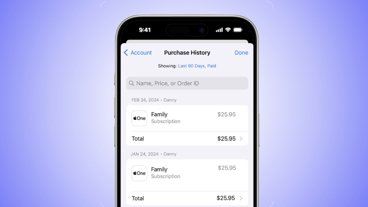USB forum sides with Apple in Palm Pre sync dispute
Palm initially petitioned the USB-IF in hopes that it would side with the handset maker in its efforts to have the Pre sync with Apple's iTunes music application, according to Digital Daily. But the group responded with a letter to both Palm and Apple this week, in which it said the Pre's alleged use of Apple's vendor ID violated its rules.
"Under the Policy, Palm may only use the single Vendor ID issued to Palm for Palm’s usage," the USB-IF letter states. "Usage of any other company’s Vendor ID is specifically precluded. Palm’s expressed intent to use Apple’s VID appears to violate the attached policy."
The letter also said that Apple's use of the vendor ID to limit iTunes syncing to proprietary hardware like the iPhone and iPod is within the rules of the USB-IF. It specifically said that Apple's actions are not "improper."
The USB-IF is a non-profit organization that supports the Universal Serial Bus and sets the standards for the hardware input. Unique vendor IDs are necessary for developing USB products.
Since the launch of the Palm Pre, the company and Apple have been engaged in a back-and-forth battle. When it first debuted, the Pre was able to sync with iTunes and transfer music from a user's library. Apple fired back and disabled the sync, only for Palm to respond. In the latest twist, the iTunes 9 update issued earlier this month again broke sync with the Palm Pre.
When contacted by Digital Daily, Palm said it is reviewing the USB-IF letter and intends to respond.
"We engaged with the USB-IF because we believe consumers should have freedom and choice in how and where they use the non-rights managed media they already own," Palm said.
 Katie Marsal
Katie Marsal







 Amber Neely
Amber Neely
 Thomas Sibilly
Thomas Sibilly
 AppleInsider Staff
AppleInsider Staff
 William Gallagher
William Gallagher
 Malcolm Owen
Malcolm Owen
 Christine McKee
Christine McKee










98 Comments
"We engaged with the USB-IF because we believe consumers should have freedom and choice in how and where they use the non-rights managed media they already own," Palm said.
Wow, think of all the time and frustration and bad press Palm could have avoided if they had just "engaged" with their software development department to develop their own syncing software.
"We engaged with the USB-IF because we believe consumers should have freedom and choice in how and where they use the non-rights managed media they already own," Palm said.
Yes, it's sad to see Palm, which was once a great technology company, stoop to this level of disingenuous behavior. Well, perhaps someone will buy them, otherwise, they're doomed. (Although, I think they'd be a weird fit at Nokia.) Many parallels to Apple's corporate history, and many interesting lessons to be found in the divergences.
Firstly, Palm should just create an iSync conduit (and whatever the PC equivalent is) that uses the XML files that iTunes creates for that purpose.
Secondly, Palm should take the issue higher and argue for "reverse engineering for reasons of interoperability", which would give it a chance of winning the argument, at least in some markets. Sadly, in the EU, where they might have a better chance, they're not even selling the Pre!
Personally I believe that as Apple ship iTunes as system software, it should provide a native, built-in support for third party media syncing via a specified protocol that maybe could require licensing fees from the hardware manufacturer to use.
Many parallels to Apple's corporate history, and many interesting lessons to be found in the divergences.
Say more?
I don't really understand why Apple doesn't license the ability for other devices to interface with iTunes. I don't own an iPod or iPhone because of iTunes. I own the devices because the devices are good, not because of the software they interface with. Lately, I am finding iTunes more and more annoying with each update.